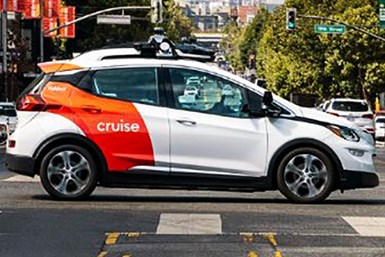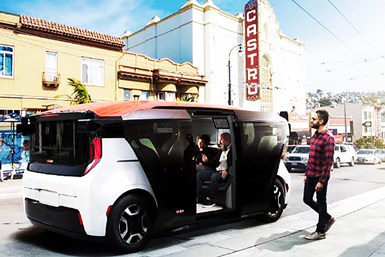Cruise Trims Autonomous Vehicle Staff
The GM affiliate still has a huge cash reserve. But the outlook for robo-taxis is uncertain.
Just over one year ago, General Motors’ Cruise affiliate was in the process of doubling its workforce as it planned to launch a robo-taxi service by the end of 2019.

Automated Chevrolet Bolt EV (Image: Cruise)
The 7-year-old startup was riding high. In addition to GM, Cruise had raised more than $5 billion from other investors—including Honda, T. Rowe Price and Japan’s SoftBank Vision Fund. The company was valued at $19 billion.
Now Cruise is laying off about 8% of its full-time employees and has no clear launch timeline.
What Happened?
A lot has changed in the last year.
In July, Cruise announced it was delaying the introduction of its self-driving vehicle service. The company had planned to use a modified version of the Chevrolet Bolt electric car. But CEO Dan Ammann said more time was needed to validate the safety of the car, so he pushed back launch plans to sometime in 2020.

Cruise Origin. (Image: Cruise)
In January, Cruise unveiled the Origin electric shuttle, which GM co-developed with Honda. GM aimed to manufacture the Origin at its revamped Detroit-Hamtramck factory by early 2022, alongside the new GMC Hummer utility truck and other EVs.
The Bolt-based robo-taxi service still was expected to bow later this year.
Then the coronavirus happened.
Pandemic Response
In an email sent to employees this week, Amman announced the layoffs as an effort to cut costs during the ongoing pandemic.
“These are very difficult decisions to make, and we do not make them lightly,” Amman wrote, according to media reports.
The move affects about 150 people, including part of an engineering team in California that is developing next-generation lidar sensors.
Fading Interest in Autonomous Vehicle
In addition to the economic fallout stemming from COVID-19, Cruise is dealing with waning interest in self-driving vehicles.
Once gung-ho on the potential for such vehicles, the industry has pushed back plans for fully autonomous cars with the focus shifting more toward advanced driver assistance systems and semi-autonomous-driving features.
However, several niche applications still seemed viable. These included robo-taxis, autonomous delivery vehicles and automated heavy-duty trucks. But COVID-19 may have changed the calculus for these ventures too.
Starsky Robotics, a San Francisco startup that was developing autonomous truck systems, went out of business due to lack of funding. Zoox, a 6-year-old Silicon Valley startup that specializes in autonomous driving software, also is laying off staff and is seeking new investors.
The case for robo-taxis is unclear. Consumers have indicated they are less likely to use public transportation until a vaccine is found for the coronavirus. This could provide an opening for single-passenger robo-taxis—although there still are concerns about how the vehicles would be cleaned between riders—but it doesn’t bode well for multi-passenger shuttles such as the Origin.
What’s Next for Cruise
For now, Cruise is looking far down the road as it plans for the future.
Analysts note that the company’s huge cash reserve positions it well to weather a prolonged industry downturn.
GM also has indicated its long-term commitment. Earlier this month, CEO Mary Barra voiced her “unwavering” support to growing the business. "Cruise is well capitalized," she told analysts on a conference call. "We have and will continue to grow our team by recruiting and retaining the very best engineering and leadership talent."
Cruise reiterated this on Thursday. Despite the layoffs, company officials say the company is “doubling down on engineering work and engineering talent.”
Another good sign: Waymo raised another $750 million this week to expand its fleet of self-driving vehicles, bringing its total intake for the year to $3 billion.
RELATED CONTENT
-
Plastics: The Tortoise and the Hare
Plastic may not be in the news as much as some automotive materials these days, but its gram-by-gram assimilation could accelerate dramatically.
-
Cobots: 14 Things You Need to Know
What jobs do cobots do well? How is a cobot programmed? What’s the ROI? We asked these questions and more to four of the leading suppliers of cobots.
-
Choosing the Right Fasteners for Automotive
PennEngineering makes hundreds of different fasteners for the automotive industry with standard and custom products as well as automated assembly solutions. Discover how they’re used and how to select the right one. (Sponsored Content)








